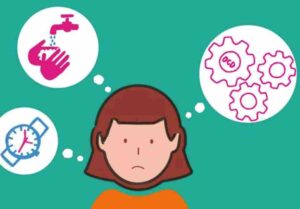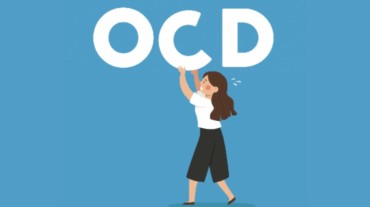When most people think of OCD, they think of someone who is overly clean or organized. While this can be a symptom of OCD, it is not the only one. There are many different types of OCD, and each person experiences it differently. In this blog post, we will explore what it is like to live with OCD from the perspective of someone who has it. We will also discuss the different symptoms that can be associated with OCD and how it affects daily life. If you are wondering what OCD is like, read on!
Contents
What Is OCD Episode?
 OCD obsessions are repeated, persistent, and unwanted thoughts, urges, or images that are intrusive and cause distress or anxiety. OCD compulsions are repetitive behaviors that a person with OCD feels the need to do to ease their anxiety or stress.
OCD obsessions are repeated, persistent, and unwanted thoughts, urges, or images that are intrusive and cause distress or anxiety. OCD compulsions are repetitive behaviors that a person with OCD feels the need to do to ease their anxiety or stress.
An OCD episode can be triggered by anything that causes anxiety or stress. For some people, it may be a specific event, such as a death in the family or a natural disaster. For others, it may be something more subtle, such as a change in routine or a new job.
Symptoms of an OCD episode can vary from person to person, but usually include some combination of obsessions and compulsions.
Examples Of OCD Episode
An OCD episode is a sudden, intense, and persistent increase in OCD symptoms. During an episode, people with OCD may have difficulty functioning at work or school, and their relationships may suffer.
OCD episode usually starts with a trigger—something that sets off people’s obsessions and compulsions.
- For example, people might see someone touch a doorknob and then not wash their hands, or then they might read an article about a disease that mentions symptoms that are similar to them. Once OCD is triggered, it’s like a switch has been flipped in their brain, and they can’t turn it off.
- Another example, people with OCD may have a fear of contamination and take excessive measures to clean their homes. People with OCD may also have a fear of making mistakes and engage in rituals, such as checking the locks on their doors multiple times, to reduce their anxiety.
An OCD episode can be exhausting both mentally and physically, and it can take a toll on my relationships and work. And they often feel like They’re on edge, and even small things can trigger their OCD.
What Triggers OCD Episodes?
Many different things can trigger an OCD episode. Some people might have a certain event happen that sets off their OCD, while for others it could be something as small as a change in routine. It’s different for everyone, but there are some common triggers that many people with OCD experience.
Stress
One of the most common triggers is stress. Stress can come from many different sources, such as work, school, family, or personal relationships. When someone is under a lot of stress, it can be harder for them to keep their OCD under control.
Anxiety
Anxiety is another common trigger for OCD episodes. It can be caused by the same things that trigger stress, but it can also be caused by other things, such as public speaking or being in a new place.
Medication Changes
Changing medication can also trigger an OCD episode. For example, if a person with OCD is taking a serotonin reuptake inhibitor (SSRI), and the dosage is increased, it can cause an OCD episode. This is because the increase in serotonin can cause an imbalance in the brain.
Sleep deprivation
Lack of sleep is considered a key factor in the development and exacerbation of OCD. A 2013 study found that people with OCD were more likely to have difficulty falling asleep and staying asleep than those without the disorder. In fact it is not uncommon for people with OCD to experience chronic insomnia.
Risk factors
Along with these specific triggers, there are some risk factors that can make a person more likely to experience an OCD episode. Some of these include:
- A history of anxiety or another mental health disorder
- Traumatic experiences
- Stressful life events
- Certain personality traits, such as perfectionism
- Genetic factor
If you have any of these risk factors, it’s important to be aware of them and to know what to do if you start to experience OCD symptoms. OCD episodes can be extremely difficult to deal with, but there are treatments that can help. If you think you might be experiencing an OCD episode, talk to your doctor or mental health professional.
How Does OCD Episode Impacts Daily life?
People with OCD often have difficulty functioning in their everyday lives. The condition can be debilitating. It can create hurdles in everyday life. It includes:
- Going to work or school
- Socializing with friends
- Taking care of basic needs
- In severe cases, people with OCD may become housebound
OCD can also cause people to miss important life events, such as weddings or funerals.
The condition can make it hard to maintain relationships, both romantic and platonic. People with OCD may withdraw from loved ones out of fear of embarrassing themselves or because they are too exhausted from managing their condition.
The good news is that there are treatments available that can help people with OCD manage their symptoms and live full, productive lives. With the right treatment, people with OCD can learn to control their obsessions and compulsions and lead normal, healthy lives.
How Long Does An OCD Episode Last?
An OCD Episode will last anywhere from a few minutes to a few hours. It depends on the severity of your OCD and how long you have been dealing with it.
If you have mild OCD, your episodes may only last a few minutes. If you have severe OCD, your episodes may last for hours or even days.
The good news is that there are treatments available that can help you manage your OCD and reduce the frequency and severity of your episodes.
If you think you might be dealing with OCD, please reach out to a mental health professional for help. You don’t have to suffer from OCD alone.
How Can You Manage It?
 OCD episodes can be manageable if you catch them early. The key is to be vigilant and to seek professional help as soon as possible. Here are some tips on how you can manage your OCD episodes:
OCD episodes can be manageable if you catch them early. The key is to be vigilant and to seek professional help as soon as possible. Here are some tips on how you can manage your OCD episodes:
Keep a journal of your thoughts and feelings: This will help you identify patterns in your thinking that may be triggering your OCD episodes.
Talk to someone you trust: Talking to someone who understands what you’re going through can be incredibly helpful. You can talk to a friend or family member who also has OCD can help you feel less alone and can give you some helpful tips on how to manage your episodes.
Seek professional help: If your OCD episodes are starting to interfere with your life, it’s important to seek professional help. A therapist who specializes in OCD can help you develop coping strategies and work through your obsessions and compulsions.
Cognitive behavioral therapy: This type of therapy can help you change your thinking patterns and the way you react to situations that trigger your OCD.
Exposure and response prevention: With this treatment, you’ll gradually be exposed to the things that trigger your OCD while learning ways to prevent yourself from engaging in compulsions.
Medication: Antidepressants are often used to treat OCD. These medications can help reduce your obsessions and compulsions.
Living with OCD can be difficult, but there are ways to manage it. The key is to be open about your condition, seek professional help, and find the treatment that works for you. With the right support, you can live a full and satisfying life despite your OCD. Above all, don’t give up. The battle against OCD is long and hard, but every day you fight it makes you stronger.
“Recovery takes time, but eventually, you will get there if you keep fighting.”
Conclusion
It may be concluded OCD episodes are not only frustrating and confusing but also very scary. OCD may be a part of who you are, but it doesn’t have to control your life. An OCD episode is like being trapped in a never-ending loop of thoughts and behaviors that are beyond your control. It’s a living nightmare that can make you feel hopeless and alone.
You are not alone and seek treatment from a mental health professional if you think you might have OCD. Early diagnosis and treatment can make a big difference in managing the condition.
For further information and suggestions, please contact Therapy Mantra. We have a team of expert therapists that can help you overcome this problem. Get in touch with us right away to learn more about our services. You may also make an online therapy session or download our free Android or iOS app.


